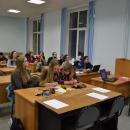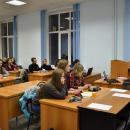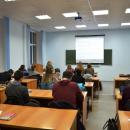Study course “Institutional Structure of the European Union”
PetrSU wrapped up the three courses on the EU developed in the framework of the EU Center in the Barents Region of Russia project implemented with the financial support of the Erasmus+ program of the European Union.
The courses consisted of 72 hours, of which 36 were in-class and 36 were provided for the independent work of the students.
The Associate Professor of the Department of World History, Political Studies and International Relations Svetlana Rozhneva read the course “Institutional Structure of the European Union” for the 3rd year Bachelor Degree students of the “International Relations” program.
The aim of the course was to introduce the students to the history of the establishment of the institutional structure of the European Union, as well as the activities of the principal institutions and bodies of the EU in accordance with the Treaty of Lisbon of October 19, 2007.
In conformity with the stated objective the goals of the course were to provide such knowledge and skills that will allow the students to analyze the history of the establishment of the institutional structure of the European Union, its legal framework, learn the key concepts, consider the institutional structure of the European Union established by the 2007 Treaty of Lisbon, study the work of the institutions of the European Union in modern times, delve into the history of their establishment, structure, areas of focus, understand the features of the institutional system of the European Union and current political developments in the modern period, analyze key trends.
The course covered such topics as the history of the establishment of the institutional system of the European Union; institutions and bodies of the European Union in accordance with the Treaty of Lisbon; European Parliament in the EU system; European Council as an institution of the EU; the Council of the European Union; European Commission as the highest body of executive power; Court of Justice of the European Union; European Central Bank as a non-political institution of the EU; Court of Auditors: history, structure, main activities; Institution of European Ombudsman; European authorities for personal data protection – supervisory authority; European Investment Bank as a non-political institution of the EU; European Investment Fund; European Economic and Social Committee; Committee of the Regions in the structure of the European Union; High Representative for Foreign Affairs and Security Policy in the institutional system of the European Union.




<<< back


